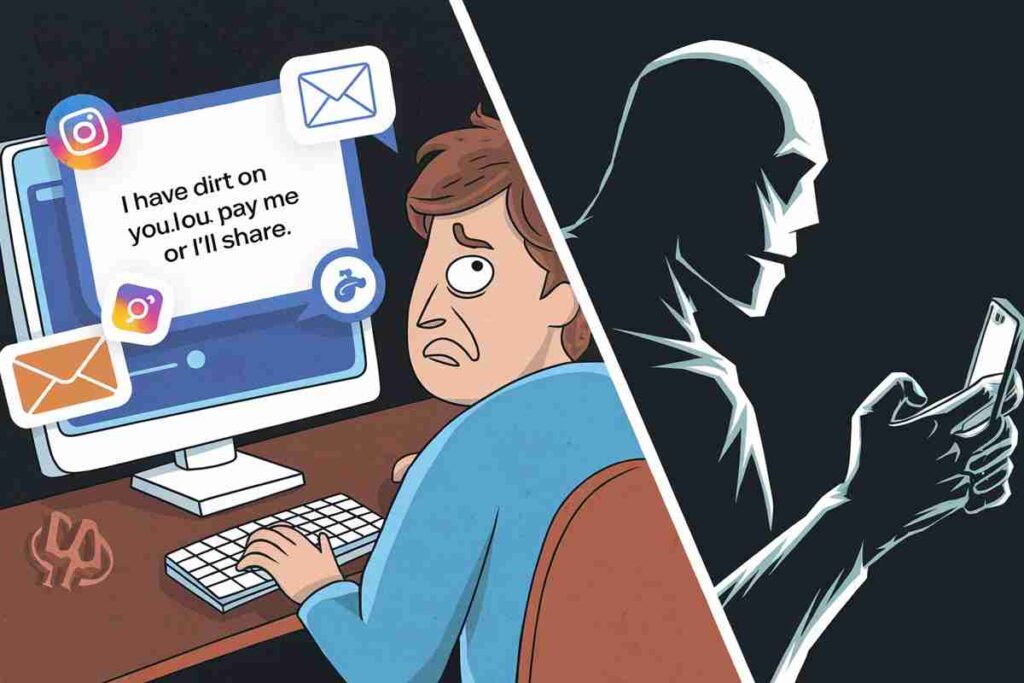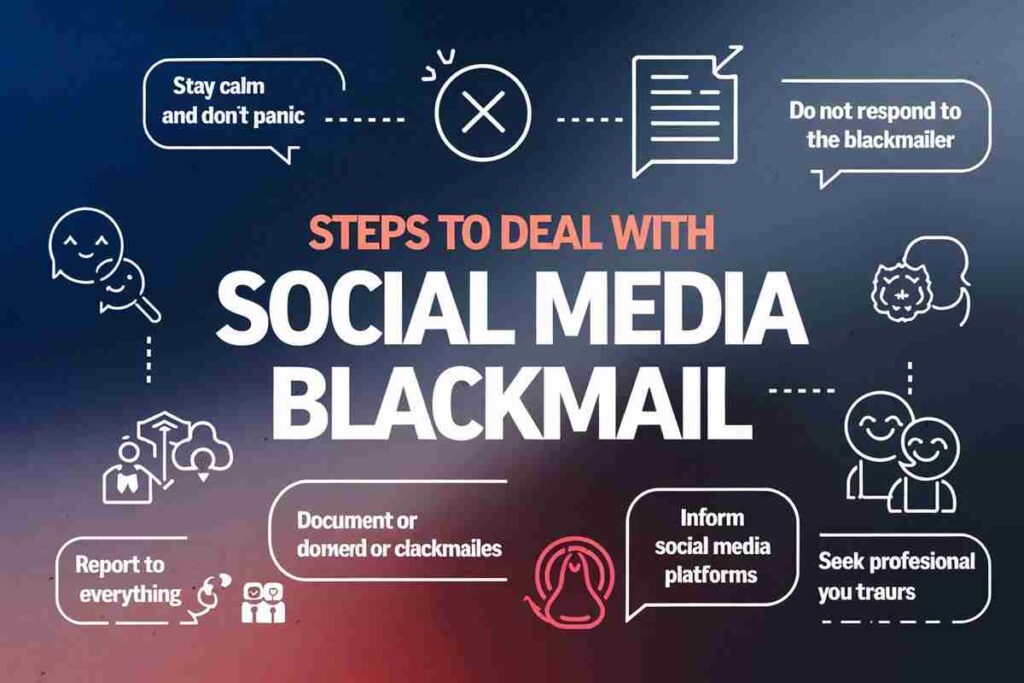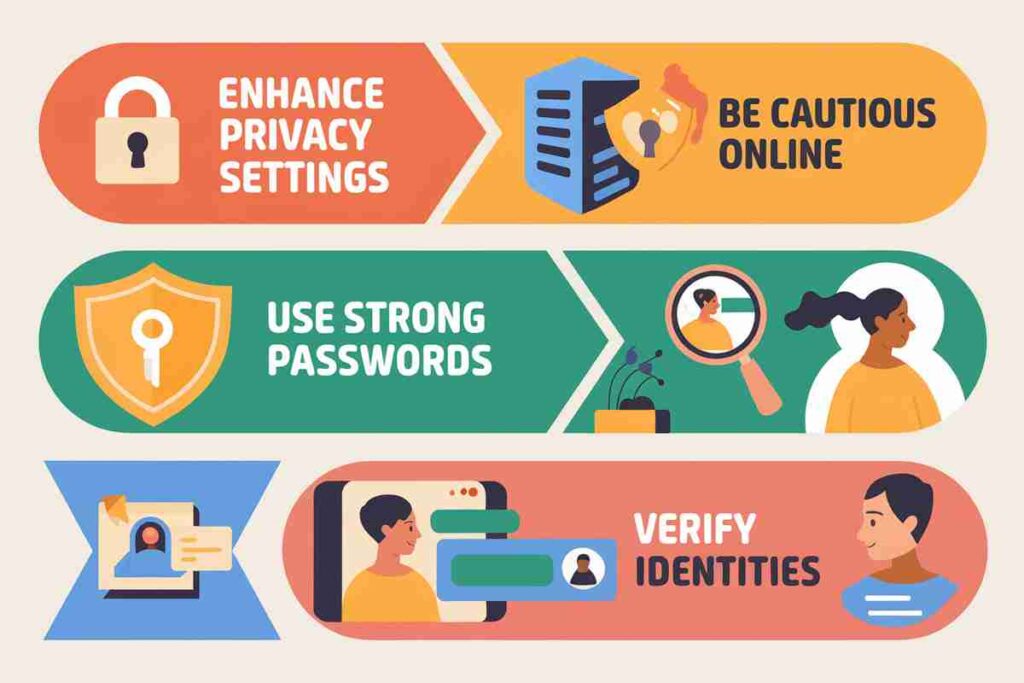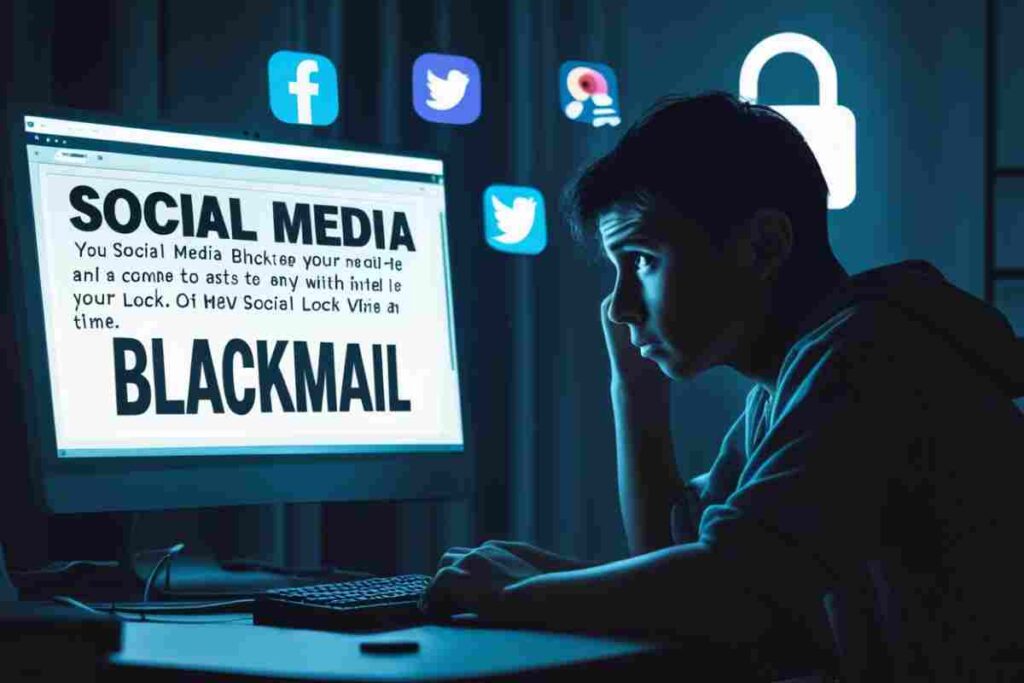Social media platforms are essential tools for staying connected, but they also come with risks, such as cybercrimes like social media blackmail.
This form of extortion involves threats to reveal personal information, images, or videos to coerce victims into meeting demands, often for money or favors.
Understanding how to address and prevent social media blackmail is vital for safeguarding your well-being and online reputation.
What is Social Media Blackmail?

Social media blackmail involves using threats and intimidation to force victims into complying with demands, often involving money or personal favors.
Blackmailers typically obtain personal information or compromising photos and threaten to expose them unless their demands are met.
This form of extortion can have devastating effects on individuals, including emotional distress and damage to personal and professional reputations.
Steps to Deal with Social Media Blackmail

1. Stay Calm and Don’t Panic
The first step when confronted with a blackmail threat is to stay calm. Panicking can lead to impulsive decisions that may worsen the situation.
Take a deep breath and gather your thoughts before deciding on your next steps. Remind yourself that you are not alone, and there are ways to handle this.
2. Do Not Respond to the Blackmailer
It is crucial not to engage with the blackmailer or comply with their demands. Responding can encourage them to continue their threats.
They may perceive your fear or desperation as an opportunity to escalate their demands. Silence can often be the most powerful response.
3. Document Everything
Collect and save all evidence of the blackmail, including messages, emails, and any other relevant information. This documentation will be crucial for reporting the crime.
Take screenshots of conversations and note the time and date of each interaction. If the blackmailer has sent videos or images, save those files as well. Thorough documentation strengthens your case when reporting the incident.
4. Report to Authorities
Reporting blackmail to local law enforcement is a critical step. Provide them with all the documented evidence. In the US, you can also report the crime to the Internet Crime Complaint Center (IC3).
Law enforcement agencies have protocols for dealing with such crimes and can provide guidance on your next steps. If you’re unsure about how to report blackmail to the police, consider seeking legal advice beforehand to prepare yourself.
5. Inform Social Media Platforms
Most social media platforms have strict policies against harassment and blackmail. Report the blackmailer’s account to the relevant platform.
They typically have procedures to handle such incidents and can assist in blocking and taking down the blackmailer’s profile. Social media companies take these reports seriously, and your cooperation may help protect others from falling victim to the same individual.
6. Seek Professional Help
Consider contacting cyber investigators or professionals who specialize in handling online extortion and blackmail.
These experts can help trace the blackmailer and gather further evidence. They may have access to tools and resources that can provide insight into the identity of the perpetrator.
7. Tell Someone You Trust
Dealing with blackmail can be overwhelming. Confide in a trusted friend or family member for emotional support and guidance.
Sharing your situation can relieve some of the burden you may be feeling and can provide you with additional perspectives on how to deal with the situation.
Preventive Measures Against Social Media Blackmail

1. Enhance Privacy Settings
Regularly review and update the privacy settings on your social media accounts to limit the amount of personal information visible to strangers.
Adjust your settings to restrict who can see your posts, photos, and personal details. By limiting your audience, you reduce the risk of falling victim to blackmail.
2. Use Strong Passwords
Use complex passwords and change them regularly to protect your accounts from being hacked.
A strong password typically includes a mix of letters, numbers, and special characters. Additionally, consider enabling two-factor authentication (2FA) for added security.
3. Be Cautious Online
Be wary of sharing personal information or engaging with strangers on social media. Always verify the identity of people you interact with online.
If someone asks for personal details or makes you feel uncomfortable, trust your instincts and disengage. Remember that once something is shared online, it can be difficult to remove.
4. Educate Yourself and Others
Educate yourself about the risks associated with social media use and discuss these issues with your friends and family.
Awareness is key to prevention. Encourage those close to you to adopt safe online practices, and create an environment where discussing potential threats is open and constructive.
Conclusion
Social media blackmail is a serious crime that can have devastating effects. Stay calm, avoid responding to threats, document evidence, and seek help from authorities and cyber investigators to protect yourself.
If someone is blackmailing you with videos or images, remember to report the incident to the police and the relevant social media platform. Staying informed about online safety is crucial, and sharing your knowledge can help create a safer environment for everyone.
FAQs
What should I do if someone threatens to expose my private photos?
Stay calm, document everything, and avoid engaging with the blackmailer. Report the situation to authorities and social media platforms.
Can I report social media blackmail anonymously?
Many platforms allow anonymous reporting, but providing your identity can help law enforcement investigate effectively.
What information should I collect as evidence of blackmail?
Save messages, emails, screenshots, and any compromising images or videos. Document dates and times for clarity.
How can I protect myself from future blackmail?
Enhance your privacy settings, use strong passwords, and be cautious about sharing personal information online.
What if the blackmailer knows my location?
Notify local law enforcement about the threat, as they can offer guidance on personal safety measures.
Is it safe to confide in friends or family about my situation?
Yes, sharing your experience with trusted individuals can provide emotional support and practical advice.
How can I find cyber investigators to help me?
Search online for cybersecurity firms specializing in online extortion, or ask for recommendations from trusted sources.
What are the potential legal consequences for blackmailers?
Blackmail is a crime and can result in severe penalties, including fines and imprisonment, depending on local laws.



